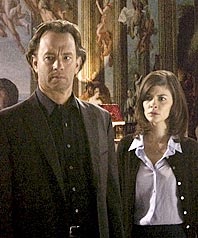
Dan Brown’s pointy-headed potboiler The Da Vinci Code might actually be the threat to Christianity that its critics claim, but there are many such threats out there—among them works by Deist scholars that speculate authoritatively on the multiple human authors and extra-divine political intentions of the New (and, for that matter, Old) Testament. Where Brown ups the ante is in spinning a matriarchal counter-theology that borders on pagan goddess-worship, and in making the reactionary-Catholic Opus Dei sect a bastion of homicidal zealots. Throw in car chases, gory murders, skulking bishops, a mysterious criminal mastermind, a self-flagellating killer albino, papyri in booby-trapped vials, and cryptogrammatic clues hidden in masterpieces of Western art, and you’ve got yourself a publishing phenomenon that even a lot of churchgoers can’t resist.
The divinely uninspired adaptation by director Ron Howard and screenwriter Akiva Goldsman makes little of all this: The movie is a Shaggy Grail story without a whisper of passion—not even the passion for intellectual gamesmanship that buttressed the glop in the pair’s A Beautiful Mind. Given the furor surrounding its opening, The Da Vinci Code is an embarrassing nonevent. You can imagine Catholic leaders emerging from cinemas and telling their picketers to go home.
For a start (and a finish), Brown’s subversive thrust has been softened. In the book, it’s presented as fact that Jesus wasn’t divine: He was merely a major prophet until the emperor Constantine came along in the fourth century and—to shore up his own power—re-orchestrated the religion around the whole son-of-God thing. In the film, that’s just a theory—and, more important, a theory disputed by the nice-guy hero and “famed symbologist” Professor Robert Langdon (Tom Hanks). To clinch the deal, the theory’s proponent is an eccentric semi-invalid called “Sir Leigh Teabing,” a sodomite moniker if ever there was one, and played by an extra-fruity Sir Ian McKellen. Now, really: Whose side would you be on?
After an Opus Dei bishop (Alfred Molina) fingers Langdon for the murder of a Louvre curator, the symbologist and the French police cryptologist Sophie Neveu (Audrey Tautou) follow the dead heretic’s fancy clues in search of a secret that could transform the modern world. Their trek should at least produce some juicy set-pieces: Think what a haunted Catholic like Alfred Hitchcock would have made of this material. But novelist Brown keeps it all rather dry, and Goldsman brings nothing—not even shameless Hollywood religiosity—to the party. Was the screenwriter so worried he’d be the target of anti-Semitic fusillades that he kept The Da Vinci Code at arm’s length? Maybe the job should have gone to a Catholic writer who would have identified with and preserved Brown’s wise-ass-altar-boy tone, because without it there’s nothing left except generic thriller devices and a director too timid to give those a charge. Howard can’t even make something of what should have been a breathtaking murder scene: the Louvre Museum at night. He blurs the backgrounds.
I felt sympathy for Hanks. This is obviously a money job, but it’s probably no fun for an actor with his smarts when there’s nothing to play—no subtext, no strong objective, and no characters of stature to go up against. Hanks is upstaged by his suit. (It’s a trim charcoal number.) Pretty though she is, Audrey Tautou is a bigger washout. A textbook gamine (the text is Amélie), she seems bred for airy enchantment, not commonsensical gumption; and her very approximate English turns even rudimentary dialogue into a linguistic adventure. She was obviously cast because the script said, “French girl,” and the studio execs said, “Call Tautou’s agent”—the way the script said, “hoary Englishman,” and the execs said, “Call McKellen’s agent,” and the script said, “French cap-i-tain,” and the execs said, “Call the Godzilla guy’s agent, Jean Reno.” A less obvious—but equally bad—call was casting the pale blond Paul Bettany as the killer monk Silas. Bettany is a cool and slender and diffident Englishman. He’s a fine actor, but he has to work too hard to convey the volcanic inner life that’s meant as a counterpoint to the abominable snowman exterior.
If there’s anything to be learned from this dud, it’s that when you decide to adapt an explosive property like The Da Vinci Code, playing it safe isn’t safe: Either swallow hard and make the damnable thing or give it to someone with more guts and/or less to lose. Here is a saga that bombards the very foundations of Western religion. But onscreen, there seems to be absolutely nothing at stake.
E-mail: filmcritic@newyorkmag.com.
